#menopause
Text
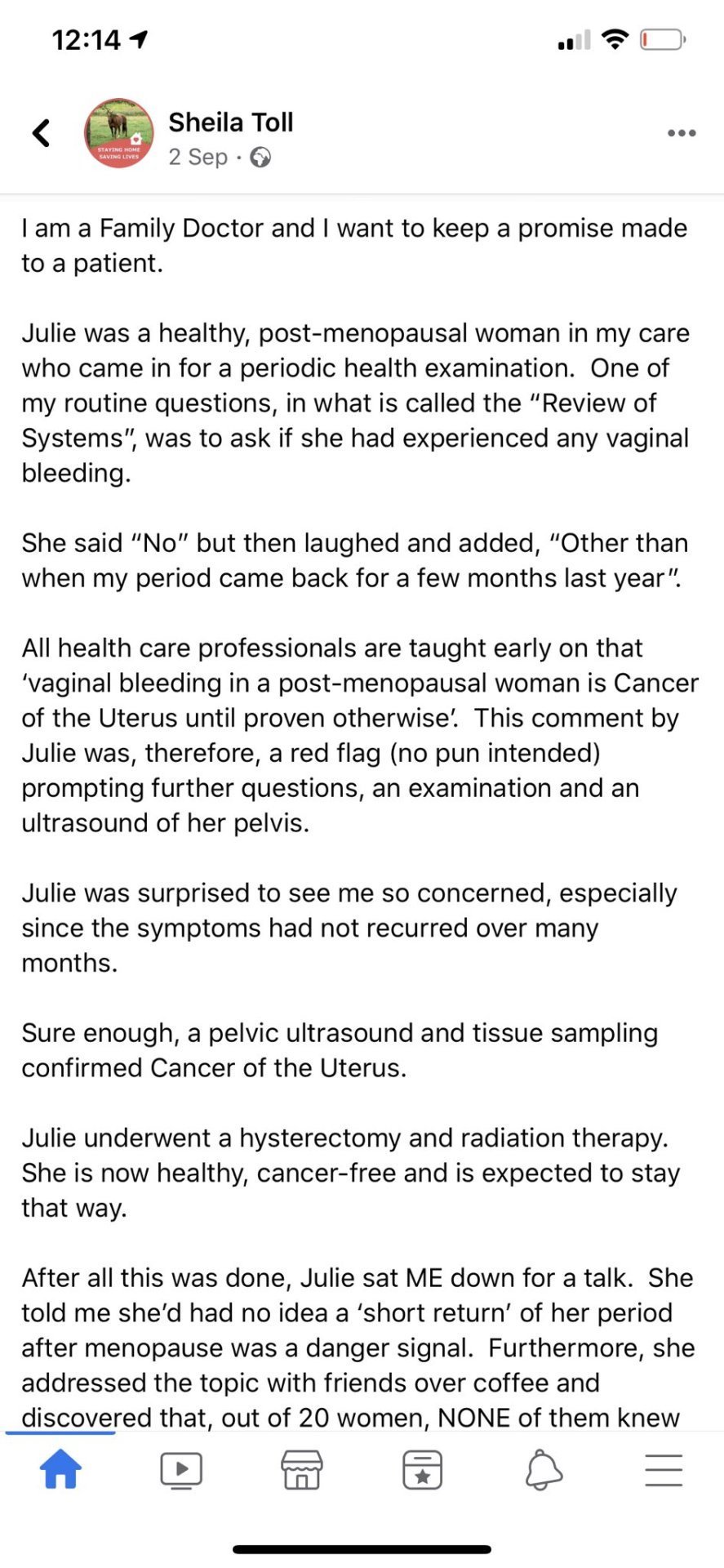
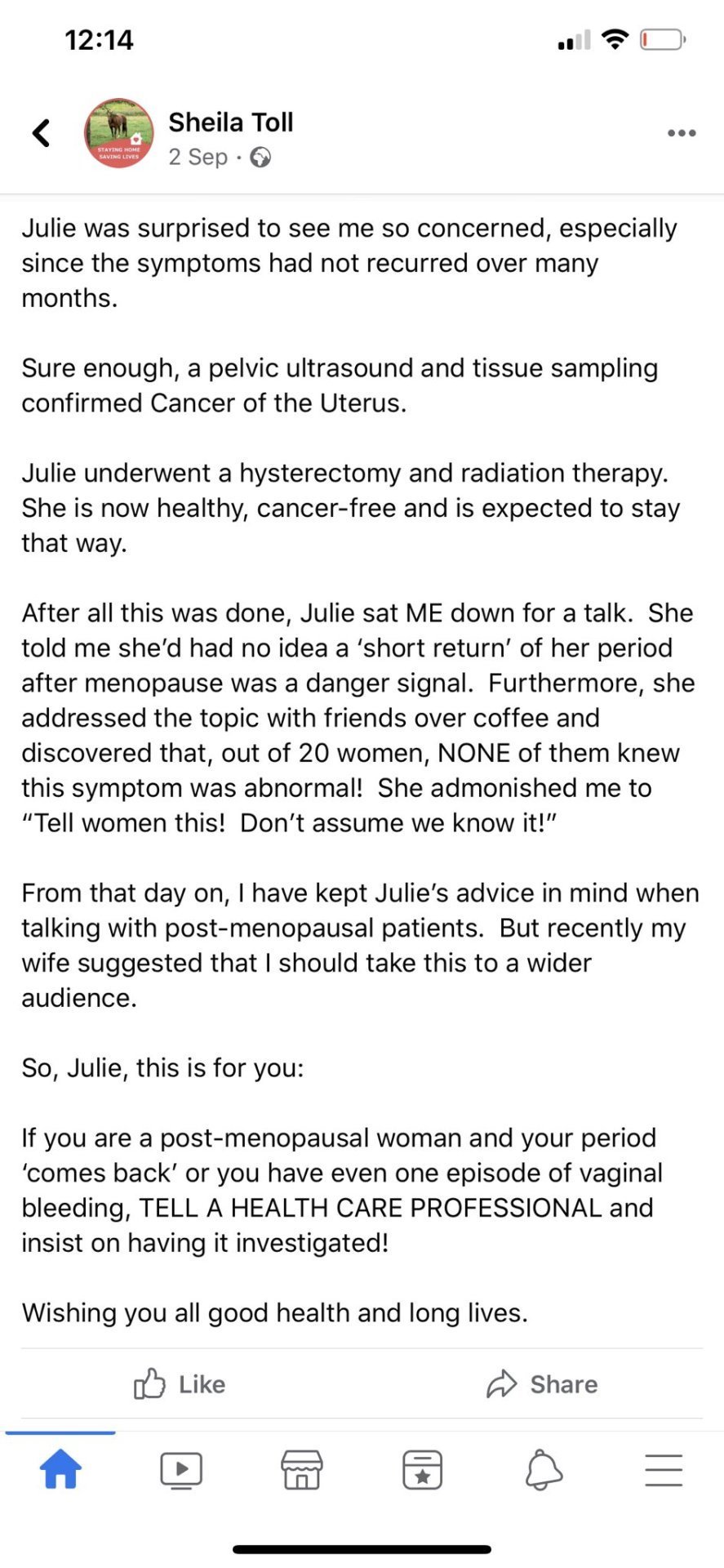
[Image description: Two smartphone screenshots of a Facebook post by a person named Sheila Toll posted 2 Sep. It is black text on a white background and the post is public. The post reads:
I am a Family Doctor and I want to keep a promise made to a patient.
Julie was a healthy, post-menopausal woman in my care who came in for a periodic health examination. One of my routine questions, in what is called the “Review of Systems”, was to ask if she had experienced any vaginal bleeding.
She said “No” but then laughed and added, “Other than when my period came back for a few months last year”.
All health care professional are taught early on that ‘vaginal bleeding in a post-menopausal woman is Cancer of the Uterus until proven otherwise’. This comment by Julie was, therefore, a red flag (no pun intended) prompting further questions, an examination and an ultrasound of her pelvis.
Julie was surprised to see me so concerned, especially since the symptoms had not recurred over many months.
Sure enough, a pelvic ultrasound and tissue sampling confirmed Cancer of the Uterus.
Julie underwent a hysterectomy and radiation therapy. She is now healthy, cancer-free and is expected to stay that way.
After all this was done, Julie sat ME down for a talk. She told me she’d had no idea a ‘short return’ of her period after menopause was a danger signal. Furthermore, she addressed the topic with friends over coffee and discovered that, out of 20 women, NONE of them knew this symptom was abnormal! She admonished me to “Tell women this! Don’t assume we know it!”
From that day on, I have kept Julie’s advice in mind when talking with post-menopausal patients. But recently my wife suggested that I should take this to a wider audience.
So, Julie, this is for you:
If you are a post-menopausal woman and your period ‘comes back’ or you have even one episode of vaginal bleeding, TELL A HEALTH CARE PROFESSIONAL and insist on having it investigated!
Wishing you all good health and long lives. End image description.]
1K notes
·
View notes
Text
On Power, and on Powering Through, and Why They’re Really Not the Same
I don’t pay much attention to personal attacks in reviews. It comes as the flipside of success; an attempt by the critic to puncture what they see as too much success. But I still remember one review, just after the film of Chocolat, when two of my novels happened to be in the Top 5 at the same time, in which a (male) newspaper critic referred to me dismissively as a premenopausal woman writer. I was a little taken aback. Clearly, it was meant to disparage, but I was only 35, ten years away from the perimenopause. What exactly did he mean? It wasn’t a comment about the book (which I doubt he had even read). The obvious misogyny aside, it seemed to express resentment, not of my books, but of me, myself, my right to take up space in his world. That word – premenopausal – was at the same time a comment on my age, my looks, my value, and a strong suggestion that someone like me shouldn’t be this successful, shouldn’t be writing bestsellers, shouldn’t be so – visible.
I don’t recall the name of the man, or the paper for which he was writing. He was far from being the only journalist who felt I didn’t deserve success. I shrugged off the unpleasant comment, but he’d meant it to hurt, and it did. I still wonder why he – and his editor - thought that was appropriate. I also wonder why, 20 years on, women are still dealing with this kind of thing. It’s still not enough for a woman to be successful in her chosen field. Whatever her achievements, you can be pretty sure that at some point, some man in his 50s or 60s – maybe an Oxbridge graduate, author of an unpublished novel or two - will offer his opinion on her desirability, either in the national Press, or most likely nowadays, by means of social media. The subtext is clear: women who don’t conform to societal values of what a woman should be are asking for this kind of treatment; especially those who dare to achieve more than their detractors.
10 years after that nasty review, I finally began the journey into perimenopause. No-one told me it was happening. No-one in the media was talking about it at the time. Even my doctor never thought to mention that my symptoms – the insomnia, headaches, mood swings, anxiety, depression, sleep paralysis, hair loss, brown patches on my skin – might have a single origin. I began to feel I was losing my mind: as if I were starting to disappear. I started to doubt my own senses. I blamed it all on the stress from my job. My mother had powered through menopause – or so she led me to believe – and made no secret of her contempt for modern women who complained, or treated the symptoms as anything more than a minor inconvenience.
And so I did the same. I powered through; and when at last I began to experience the classic symptoms of menopause - irregular bleeding, hot flushes, exhaustion, night sweats so bad that I would awake in sheets that were wringing wet – it did not occur to me to seek help. After over a year of this, I finally went to my doctor, who took a few tests, cheerfully announced I was menopausal, and when I inquired after HRT, advised me to power through – that phrase again - and let Mother Nature take her course. The internet was slightly more helpful. I took up running, lost weight, cut down on alcohol, downed supplements and sleeping pills and vitamin D, and felt a little better. Then, breast cancer came to call, and by the time my treatment was done, the symptoms had more or less disappeared, or at least had been superseded by the symptoms of chemo. I congratulated myself at having powered through cancer as well as surviving menopause.
But two years later, I feel old. I look that way, too. I’ve aged ten years. Some of that’s the cancer, of course. I was quite open about my treatment when I was powering through it – partly in order to pre-empt any questions about my hair loss or any of the all-too visible effects of three courses of chemo. Not that it stopped the comments, though. Even at my lowest ebb, a sector of social media made it clear that my only concern should be to look young and feminine to anonymous men on Twitter.
Right now, I don’t feel either. My hair has gone grey and very thin. My skin, too, seems thinner; both physically and mentally. At a recent publishing event, several acquaintances failed to recognize me; others just looked through me as if I had become invisible. Invisibility would be a relief; I find myself dressing for camouflage. I tend to wear baggy black outfits. I got my OBE last week. Photographs in the Press show me talking to Prince William. I’m wearing a boxy black trouser suit, flat shoes and a red fedora. I think I look nice. Not glamorous, but comfortable; quirky; unpretentious.
On a thread of largely supportive messages, one Twitter user pops up to say: Jesus, who’d accept an honour looking like that middle-aged disaster? @Joannechocolat thought she’d make an impact? She needs a stylist. If you look in the dictionary for the definition of “dowdy”, it features this photo.
It’s not the same man who belittled me over 20 years ago. But the sentiment hasn’t changed. Regardless of your achievements, as a woman, you’ll always be judged on your age and fuckability. I ought to be used to this by now. But somehow, that comment got to me. Going through menopause isn’t just a series of physical symptoms. It’s how other people make you feel; old, unattractive, and strangely ashamed.
I think of the Glass Delusion, a mental disorder common between the 14th and 17th centuries, characterized by the belief that the sufferer was made of glass. King Charles VI of France famously suffered from this delusion, and so did Princess Alexandra Amélie, daughter of Ludwig 1st of Bavaria. The condition affected mostly high-profile individuals; writers, royals, intellectuals. The physician to Philip II of Spain writes of an unnamed royal who believed he was a glass vase, which made him terribly fragile, and able to disappear at will. It seems to have been a reaction to feelings of social anxiety, fear of change and the unknown, a feeling both of vulnerability and invisibility.
I can relate. Since the menopause, I’ve felt increasingly broken. I don’t believe I’m a glass vase, and yet I know what it feels like to want to be wrapped in a protective duvet all day. I’ve started buying cushions. I feel both transparent, and under the lens, as if the light might consume me. On social media, I’ve learnt to block the people who make mean comments. To make myself invisible. To hide myself in plain sight. I power through, but sometimes I think: why do women power through? And who told them that powering through meant suffering in silence?
Fortunately, some things have changed since I went through the menopause. Over the past few years, we’ve seen more people talking about their experiences. Menopause is likely to affect half the population. We should be talking about it. If men experienced half these symptoms, you bet they’d be discussing it. Because power isn’t silence. You’d think that, as writer, I would have worked that out sooner. Words are power. Sharing is strength. Communication breaks down barriers. And sometimes, power means speaking up for those less able to speak for themselves.
I look at myself in the mirror. I see my mother’s mouth; my father’s eyes. I see the woman I used to be; the woman I will one day become. I see the woman my husband loves, a woman he still finds attractive. A woman with a grown-up child who makes her proud every single day. A menopausal woman. A cancer survivor. A woman who writes books that make other people sit up and think. A woman who doesn’t need the approval of some man she’s never met to be happy. She can be happy now. I can. And finally, I understand. Powering through isn’t about learning to be invisible. It isn’t about acceptance, or shame, or letting Nature take its course, or lying about feeling broken. It’s looking beyond your reflection. It’s seeing yourself, not through the lens of other people’s expectations, but as yourself. The sum of everything you’ve been; of everyone who loves you. Of claiming your right to be more than glass, or your reflection in it. The right to be valued. The right to shine, regardless of age or reproductive status. Men seldom question their own right to these things. But women have to fight for them. That’s why it’s so exhausting.
This morning, instead of putting on my usual baggy black sweatshirt, I chose a bright yellow pullover. I looked at myself in the mirror. It’s not a great colour on me now, but it feels like dressing in sunshine. My husband came into the bathroom. You look –
My husband rarely gives compliments. I can’t remember the last time he commented on how I was dressed. I wondered what he was going to say. Dowdy, perhaps? Inappropriate? Like a menopausal woman in dire need of a stylist?
At last, he said: When you smile like that, you look like a friendly assassin.
A friendly assassin. I’ll take that.
Shining like the sun. That’s me.
2K notes
·
View notes
Text
The North Carolinian feminist, mother, and healer Omisade Burney-Scott, joined us to chat about menopause. As the creator and curator of Black Girls' Guide to Surviving Menopause, Omi shared insights about the change, her work, Love Craft Country, and she was sure to create a vibe.
Check out Omi's podcast Black Girls Guide to Surviving Menopause
Want to hear the WHOLE conversation? Watch the full interview HERE.

#blackexcellence365#black excellence#blackexcellence#black + excellent#menopause#omisade burney scott#black girl magic#black stories matter#black lives matter#black culture#menstruation#womens health#social justice#love craft country
967 notes
·
View notes
Text
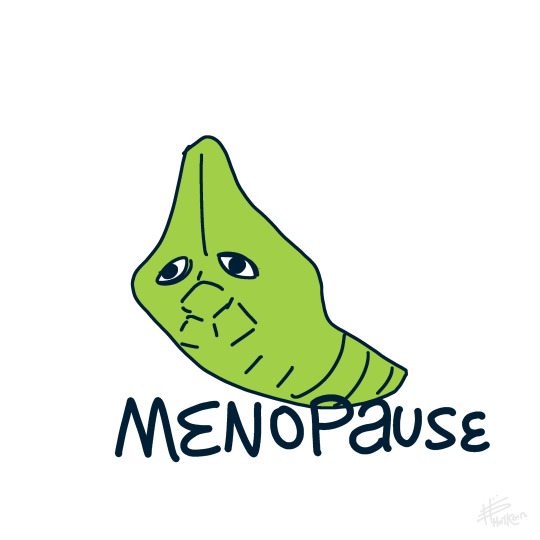
My favourite pokemom
The menopause
285 notes
·
View notes
Text
Why do humans experience menopause? It's a question that some women going through the symptoms might have asked themselves more than once.
Scientists are also baffled. From an evolutionary perspective, animals generally take every chance they can get to have as many offspring as possible to boost their odds of survival.
So why have some species evolved to have menopause, in which females live many years after they stop being able to reproduce?
Continue Reading.
105 notes
·
View notes
Text
784 notes
·
View notes
Text
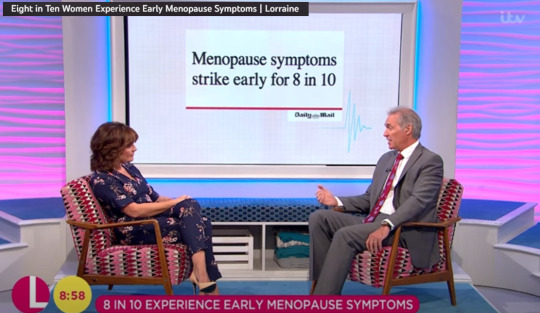

If "8 in 10" experience it early.... is that not the more usual time to expect it?
Is that how statistics work?
#women's health#menopause#skinner memes#out of touch#healthcare#hormones#getting older#women's bodies#menstruation#btw menopause makes adhd symptoms worse
174 notes
·
View notes
Text
"When menopause is discussed in Western society, it's often viewed negatively, as a cruel joke or even as a disease. This stems from the harmful belief that women lose value once they are no longer able to reproduce and the false hypothesis that menopause is a biological flaw as there is no equivalent for men who can make sperm intotheir old age."
The Menopause Manifesto by Jennifer Gunter
#menopause#intersectional politics#intersectional feminism#intersectional feminism 101#intersectionality#book suggestion#book quotes#book quotations
266 notes
·
View notes
Text
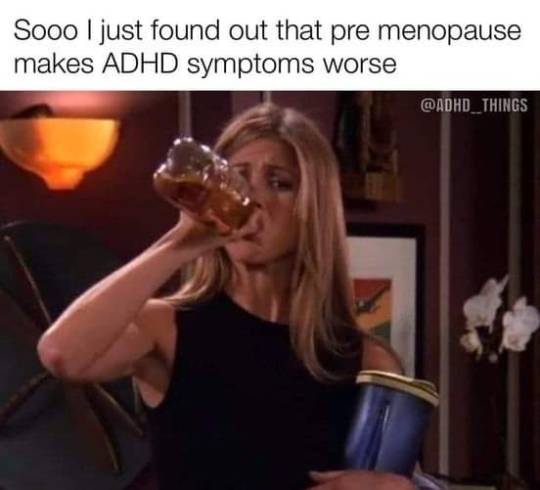
Yooooo
#funny#lol#funny post#lolol#hilarious#comedy#funny pics#funny images#meme#dank memes#menopause#adhd#neurodivergent#like damn
164 notes
·
View notes
Text
so i saw some people comment on my larissa menopause post (lol) saying they didn't know menopausal transition was a thing and like. i feel compelled to do this now adsjkhfgfsdhk. this ain't sex ed this is just. ed. lol. info under the cut! keep in mind i am NOT a medical professional. this is just like. the most general of knowledge lol.
so. menopause is a point in time 12 months after a your last period. the years leading up to that point, when one may have changes in their monthly cycles, hot flashes, or other symptoms, are called the menopausal transition or perimenopause. the menopausal transition most often begins between ages 45 and 55, but can rarely begin earlier/later. after that 12 month period, you enter post-menopause.
perimenopause typically last for about 7 years, but can last up to 14.
symptoms of perimenopause are, for some, mild and short-lasting, and for others, they can be disruptive and long-lasting (my mother dealt with them for about 10 years!)
usual symptoms are the following:
changes to your period (change in frequency, level of bleeding -- keep in mind you could still get pregnant during perimenopause, and that remains the case until actual menopause takes place, so if you want to avoid that you should employ your preferred method of contraception), mood changes/changes in libido, insomnia/sleep problems, hot flashes and chills, night sweats (can influence sleep quality), weight gain, headaches, heart palpitations, stiff or achey joints, memory problems, dryer skin, thinner hair, vaginal dryness/sensitivity, problems with pelvic floor muscles which can cause urinary incontinence in some cases
as far as i gathered, you may experience any of these symptoms during perimenopause, menopause, or post-menopause. a couple of years after menopause symptoms should go away,
you can't know how severe your symptoms will be, and the best guess you can make is to look at your family history to make an educated guess, however it doesn't have to mean much. some people will experience virtually no symptoms, and some will experience symptoms in such severity that they are disruptive to their daily life.
post-menopause signals the end of your reproductive years, and you’ll be in this stage for the rest of your life. ovaries are still making low levels of the hormones estrogen and progesterone, but you're no longer ovulating, so you can’t become pregnant
you’ll continue to experience menopause symptoms for about 2-7 years after your final menstrual cycle (can be longer for some people), but after that time, symptoms often get milder or completely go away.
women in post-menopause are at a higher risk for certain health conditions like heart disease and postmenopausal osteoporosis
#menopause#what if i tag this.... larissa weems#sojafhisuhdsudfu#i'm sorry#i'm writing a fic and i cannot be stopped
68 notes
·
View notes
Link
...In this foraging society, it turns out, grandmothers were more important to child survival than fathers. Mom and grandma were keeping the kids fed. Not Man the Hunter.
This finding led Hawkes to completely re-evaluate what she thought she knew about human evolution. Grandmothers were crucial in this environment to childhood survival. So maybe it wasn't an accident that humans are the only great ape species in which women live so long past reproductive age. If having a helpful grandmother increased a kid's chances of survival, natural selection may well have started selecting for older and older women.
Sarah Hrdy is a primatologist at U.C. Davis who also studies connections between child-rearing and human evolution. She has spent a lot of time thinking and writing about a related topic. She says, "An ape that produced such costly, costly slow-maturing offspring as we have could not have evolved unless mothers had a lot of help." First among these helpers, she thinks, would have been grandma – likely joined eventually by many other new helpers, who could have included fathers, aunts, uncles and siblings.
If young kids were being fed by people besides mom, she thinks that over evolutionary time, this could have led humans to develop the deep social orientation that characterizes our species – to care so much about the thoughts and intentions of other people. She says, "People often try to explain the fact that humans are so good at cooperating by saying, well, we needed to cooperate in order to succeed at big game hunting, or so that men in one group could bond with other men to go wipe out the neighboring group. What that doesn't do is explain why these traits emerge so early."
I know the overwhelming majority of Tumblr users are teens to early twenties, but I want to tell you now, while you are still young, that this is not the height of your life. Your value does not diminish as soon as you hit thirty. You do not lose your relevance or your value once you stop being able to produce children. Your wisdom and your power matures with you.
#you are not your youth#feminist witch#crone#feminism#grandmother theory#divine female#goddess worship#menopause#man the hunter is a male myth
718 notes
·
View notes
Text
i wrote a little pre-relationship ditty, am unsure how i feel about it but it's up lol
46 notes
·
View notes
Text
Some healthcare advice for my lovely ladies here..
I was just reading this New York Times article about how women of color experience Perimenopause and Menopause differently from the conventionally established standards according to the White Race.
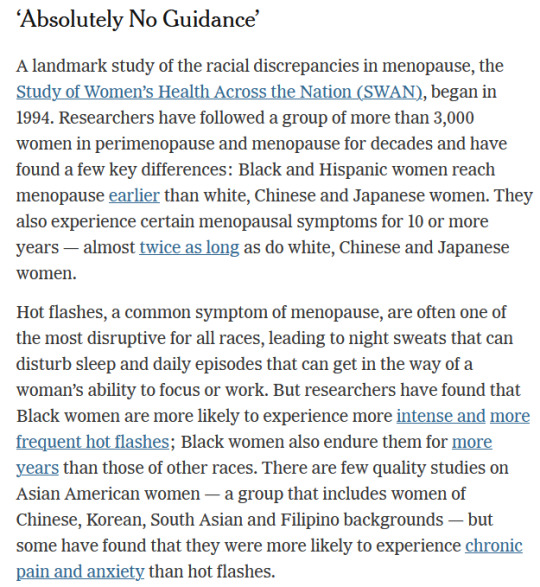
Clearly, women from different races have very different experiences, duration, and intensity of symptoms. Just a gentle reminder to all my wonderful women here: do not ignore what your body tells you. Healthcare systems are biased to ignore women's pain, doctors have limited understanding of our anatomies, and these issues are far worse when we account race into the equation as well. Speak up if your doctor doesn't take you seriously.
Also, always remember to get scanned for breast and cervical cancers. Keep an eye out for anything unusual. Love y'all! ❤️
The article is behind a paywall. Please message me if you want to read the whole article!
#not tenoch related#healthcare systems are racist too#and sexist#womens health#women of color#healthcare racism#medical racism#menopause#perimenopause
47 notes
·
View notes
Text
Every female bodied person needs to read this
Every female bodied person needs to read this, and everyone should send the link to every female bodied person they know
22 notes
·
View notes
Text
Humans are outliers for the way many of us, along with a handful of toothed whale species and Asian elephants, will live well beyond our reproductive years.
The rarity of menopause among animals has long puzzled researchers, and so has its origins since our close primate relatives didn't appear to share this marker of fertility's end.
Or so we thought. Researchers have discovered a remote population of wild chimpanzees in Uganda do in fact live decades after they go through menopause, displaying similar hormonal changes as those seen in humans.
University of California evolutionary anthropologist Brian Wood and colleagues analyzed 21 years of demographic and behavioral data on the Ngogo community of wild chimpanzees in Kibale National Park in southwest Uganda, to calculate their fertility rates and survivorship.
Continue Reading
71 notes
·
View notes
Text
Me: Since t causes menopause-
Transfem: Tea causes menopause??? What kind of tea are you drinking???
Me:
Me: Testosterone. I’m on testosterone.
#it doesn't actually cause menopause#just menopause symptoms#hrt#transmasc#ftm#trans guy#trans man#transgender#trans#transfem#mtf#trans girl#trans woman#nonbinary#genderqueer#lgbt#lgbt memes#trans solidarity#testosterone#menopause
114 notes
·
View notes